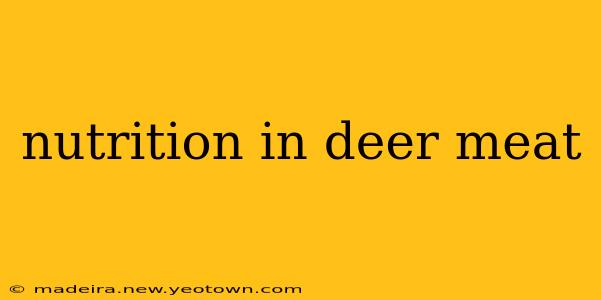For centuries, venison, or deer meat, has been a staple food source for many cultures, prized not only for its delicious taste but also for its remarkable nutritional profile. Unlike mass-produced meats, deer live a natural lifestyle, foraging on diverse vegetation, resulting in lean, nutrient-rich meat that offers a plethora of health benefits. Let's delve into the world of venison nutrition and discover why it's becoming increasingly popular among health-conscious individuals.
What are the nutritional benefits of deer meat?
Deer meat boasts a significantly lower fat content compared to beef, pork, or lamb. This leanness contributes to its lower calorie count, making it an ideal choice for those watching their weight or following a low-fat diet. However, it's not just about low fat; venison is packed with essential nutrients. It's a fantastic source of high-quality protein, crucial for building and repairing tissues, supporting immune function, and maintaining overall health. Furthermore, it's rich in iron, zinc, and B vitamins, all vital for various bodily processes. The absence of added hormones and antibiotics in naturally raised venison adds another layer to its nutritional superiority.
Is deer meat healthier than beef?
This is a question frequently asked, and the answer is nuanced. While both are excellent sources of protein, venison generally surpasses beef in terms of leanness and lower fat content. Beef, depending on the cut, can be significantly higher in saturated fat, a type of fat linked to increased cholesterol levels. Venison, on the other hand, typically contains less saturated fat and more beneficial unsaturated fats. However, the exact nutritional content can vary depending on factors like the deer's diet, age, and the specific cut of meat. The key takeaway is that, overall, venison often presents a healthier option compared to beef, particularly for those seeking a leaner, lower-fat protein source.
How much protein is in deer meat?
A typical 3-ounce serving of venison provides approximately 20-25 grams of protein. This makes it a powerhouse for protein, exceeding the protein content of many other lean meats. This substantial protein content contributes to satiety, helping you feel fuller for longer and potentially aiding in weight management. The high-quality protein in venison also contains all nine essential amino acids, meaning your body can readily utilize them for building and maintaining muscle mass, supporting immune function, and various other metabolic processes.
Is deer meat good for weight loss?
Due to its low-fat, high-protein composition, venison can be a valuable asset in a weight-loss diet. The high protein content contributes to satiety, curbing hunger pangs and reducing overall calorie intake. The lower fat content means fewer calories from fat are consumed, further contributing to weight management efforts. Furthermore, the various micronutrients present in venison support overall metabolic health, potentially enhancing the effectiveness of weight-loss strategies. However, it's crucial to remember that a balanced diet and regular exercise are key components of any successful weight-loss program.
What are the potential downsides of eating deer meat?
While generally considered a healthy meat, there are a few potential drawbacks to consider. The most significant concern is the potential for parasites. Proper handling, preparation, and cooking are essential to eliminate any potential risks. Also, individuals with specific dietary restrictions or allergies should always consult with a healthcare professional before significantly altering their diet. Finally, the availability and cost of venison can vary depending on location and season.
Conclusion: A Delicious and Nutritious Choice
Venison presents a compelling alternative to more conventional meats. Its remarkable nutritional profile, packed with high-quality protein, essential vitamins, and minerals, while being low in fat, makes it an excellent choice for those seeking a healthy and flavorful protein source. While proper preparation is essential, the benefits of incorporating venison into a balanced diet can be significant for overall health and well-being. Remember to consult with a healthcare professional or registered dietitian to determine how venison fits best into your individual dietary needs.

